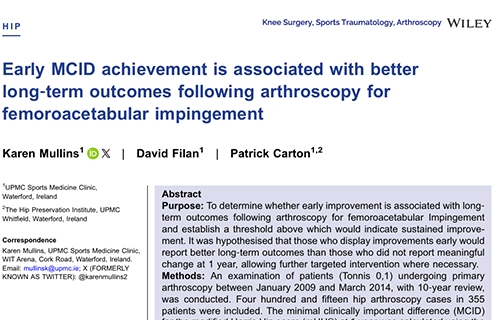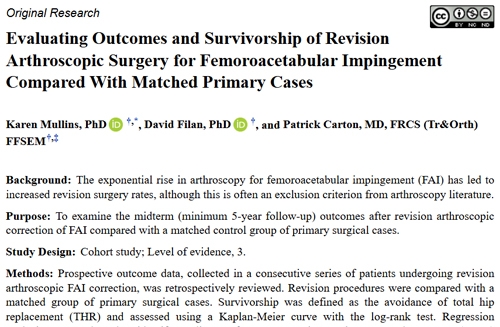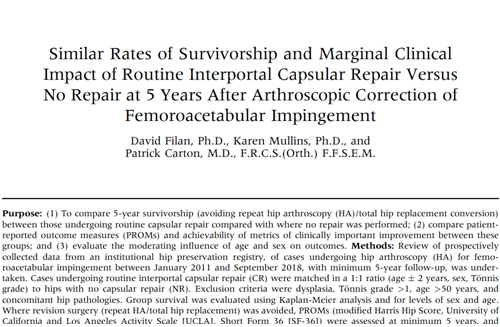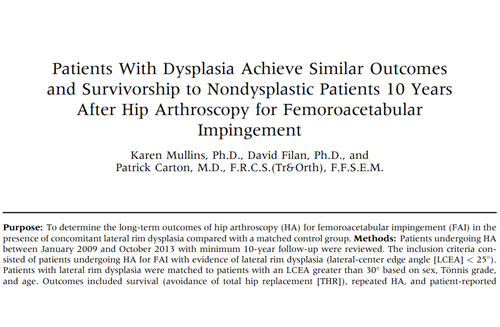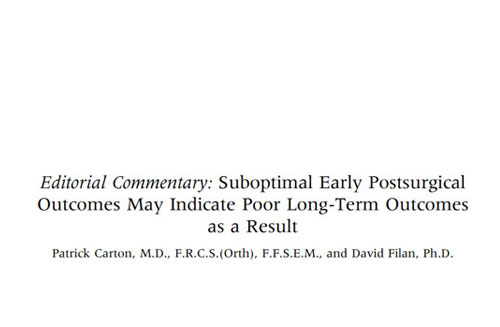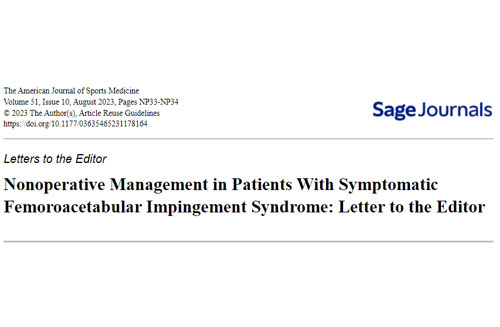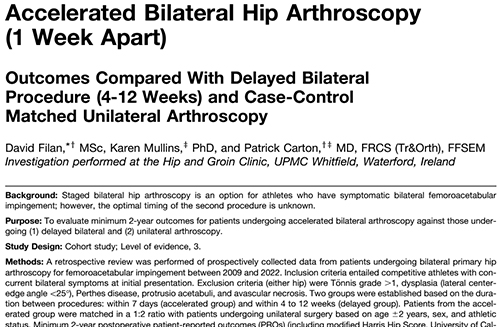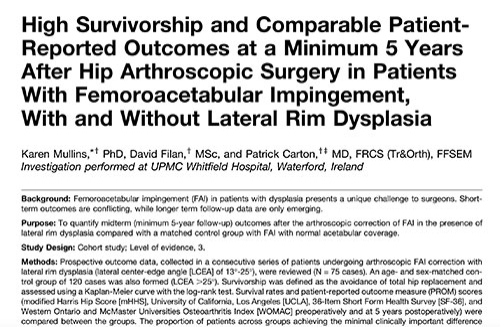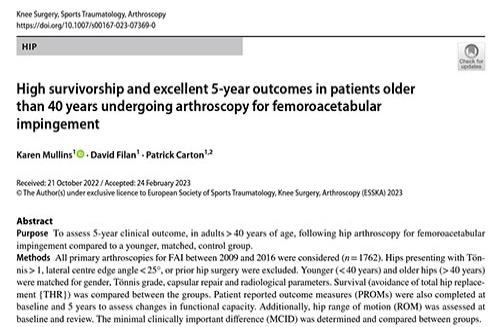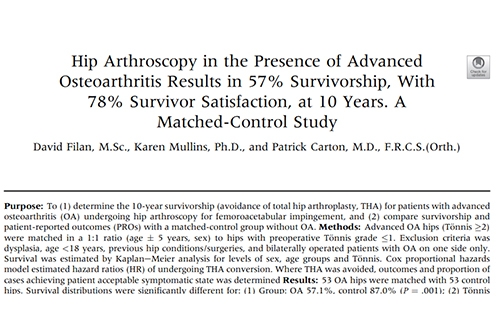Recent Publications
Early MCID achievement is associated with better long-term outcomes following arthroscopy for femoroacetabular impingement
Achieving the minimal clinical important difference (MCID) at 1‐year post-op is associated with higher 10-year survival rates, lower revision arthroscopy rates and increased levels of long-term patient-acceptable symptom state (PASS). For patients failing to achieve this important improvement threshold by 1-year post-op, additional rehabilitation or interventions that may further improve recovery and potentially increase the likelihood of a better longer‐term outcome may be warranted. Read More
Evaluating Outcomes and Survivorship of Revision Arthroscopic Surgery for Femoroacetabular Impingement Compared With Matched Primary Cases
Residual bony deformity is the most common indication for revision arthroscopy. Revision procedures may have a lower survival than primary cases, although overall survivorship at midterm follow-up is high. Read More
Similar Rates of Survivorship and Marginal Clinical Impact of Routine Interportal Capsular Repair Versus No Repair at 5 Years After Arthroscopic Correction of Femoroacetabular Impingement
Regardless of whether the interportal capsulotomy is routinely repaired as part of the arthroscopic correction of FAI, there is significant and similar improvement in measures of pain, activity level, and generalized well-being at 5 years postoperatively relative to baseline scores.Read More
Patients With Dysplasia Achieve Similar Outcomes and Survivorship to Nondysplastic Patients 10 Years After Hip Arthroscopy for Femoroacetabular Impingement
HA for symptomatic FAI is a successful treatment in cases in which dysplasia is present. Low complication rates, comparable outcomes to cases without lateral rim dysplasia, and a high survivorship rate of 91% at minimum 10-year follow-up are observed. Increasing Tönnis angle preoperatively may increase the risk of THR conversion.Read More
Editorial Commentary: Suboptimal Early Postsurgical Outcomes May Indicate Poor Long-Term Outcomes as a Result
Recent research has shown that hip arthroscopy outcomes at 6 months correlate with long-term outcomes. In theory, a score below a certain “threshold” at 6 months might predict poor long-term outcomes and thus allow intervention to improve the future prognosis of recovery and success. Read More
Nonoperative Management in Patients With Symptomatic Femoroacetabular Impingement Syndrome - Letter to the Editor.
Nonoperative Management in Patients With Symptomatic Femoroacetabular Impingement Syndrome - Letter to the Editor.Read More
Accelerated Bilateral Hip Arthroscopy (1 Week Apart): Outcomes Compared With Delayed Bilateral Procedure (4-12 Weeks) and Case-Control Matched Unilateral Arthroscopy
Staged bilateral hip arthroscopy is an option for athletes who have symptomatic bilateral femoroacetabular impingement; however, the optimal timing of the second procedure is unknown.Read More
High Survivorship and Comparable Patient-Reported Outcomes at a Minimum 5 Years After Hip Arthroscopic Surgery in Patients With Femoroacetabular Impingement, With and Without Lateral Rim Dysplasia
As the understanding of FAI and the various contraindications for hip preservation advance, uncertainty remains as to the optimal treatment approact for patients with FAI and concomitant dysplasia. The purpose therefore of this study was to report the midterm (min 5 years) outcomes for hip arthroscopy for FAI in the presence ... Read More
High survivorship and excellent 5-year outcomes in patients older than 40 years undergoing arthroscopy for femoroacetabular impingement
The purpose of this study was to report 5-year outcomes in older adults (>40 years) undergoing arthroscopic treatment of femoroacetabular impingement and to compare their outcomes to a younger control group.Read More
Hip Arthroscopy in the Presence of Advanced Osteoarthritis Results in 57% Survivorship, With 78% Survivor Satisfaction at 10 Years. A Matched - Control Study
The purpose of this study was two-fold: 1) to determine the long term (10 years) survivorship (i.e., avoidance of a total hip replacement) for patients with advanced osteoarthritis undergoing hip arthroscopy for femoroacetabular impingement Read More

